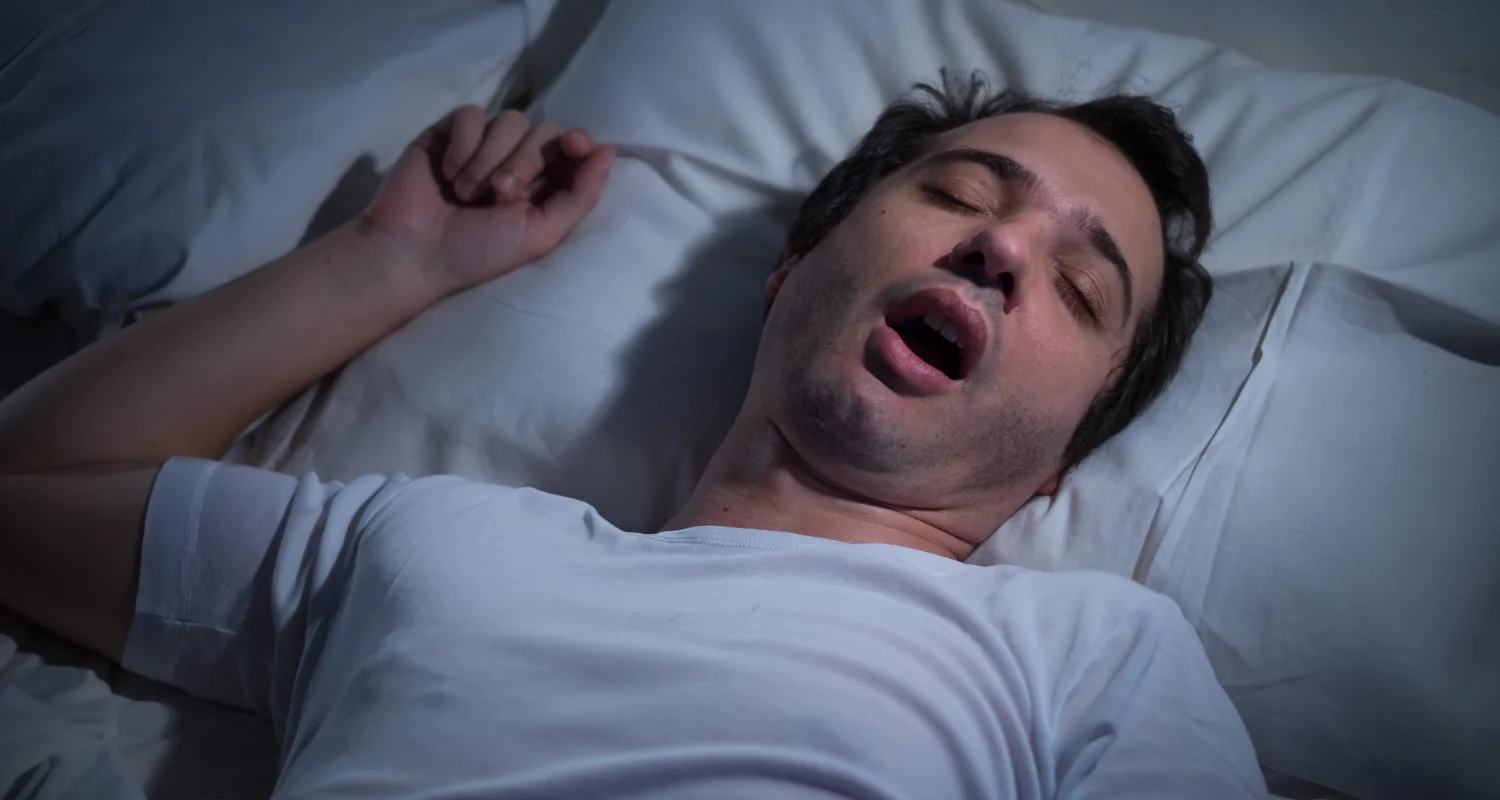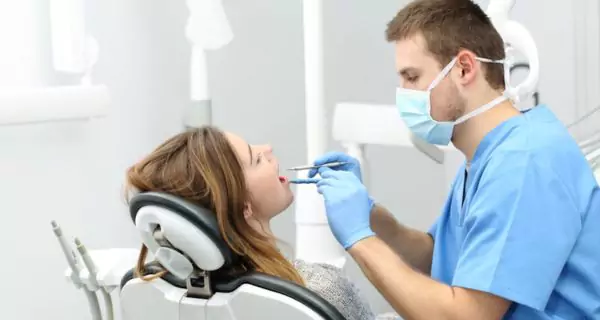Last Updated on: 27th December 2025, 07:23 am
Yes, mouth breathing is bad for your teeth, gums, and overall health. It can cause dry mouth, cavities, gum disease, bad breath, and even affect jaw development in children. It also contributes to sleep problems, snoring, and low oxygen intake. But with the right treatments, mouth breathing can be corrected.
Have you ever woken up with a dry mouth or noticed drool on your pillow? This is very common in people who habitually breathe through their mouths.
Although breathing is automatic and most people naturally breathe through their noses, some individuals cannot do so properly due to allergies, nasal congestion, or structural issues such as a deviated septum.
But what happens in these cases? Is mouth breathing bad? The answer is yes. Chronic mouth breathing can harm both oral and overall health. Let’s see how addressing this habit early can protect you.
What is mouth breathing and how does it work?
Mouth breathing happens when a person primarily breathes through their mouth instead of their nose. This can be:
- Occasional mouth breathing is normal during colds, allergies, or exercise.
- Chronic mouth breathing can cause health complications over time.
When does mouth breathing usually happen?
Mouth breathing can occur in different situations, including the following:
- During sleep: Linked to snoring, sleep apnea, or nasal obstruction.
- Due to nasal congestion: Blocked nasal passages from allergies, colds, sinus infections, or a deviated septum can force mouth breathing.
- As a habit: Some people develop mouth breathing from childhood, often due to enlarged tonsils, adenoids, or other structural issues. If not corrected, it can affect facial and dental development.
What causes mouth breathing?
Mouth breathing is usually caused by an obstructed nasal airway, meaning air cannot pass smoothly through the nose. Common causes include:
- Nasal congestion from allergies, colds, or chronic sinus infections.
- Enlarged adenoids or tonsils, especially in children.
- A deviated septum, a condition where the cartilage and bone dividing the nose are misaligned, making nasal breathing difficult.
- Nasal polyps: benign growths in the nasal passages that obstruct airflow.
- Structural factors include a high, narrow palate, small jaw size, or enlarged turbinates (nasal structures that help humidify air).
- Sleep apnea: a condition that causes breathing interruptions during sleep, often leading to mouth breathing at night.
- Stress and anxiety can trigger shallow, rapid breathing through the mouth.
- Childhood habits such as prolonged pacifier use, bottle-feeding, or thumb sucking.
Certain conditions, like asthma, frequent sinus infections, or jaw abnormalities, also increase the risk of chronic mouth breathing. In some cases, people continue this pattern even after the original nasal issue has been resolved.
Recognizing these causes early is important. Identifying and treating the underlying problem helps prevent long-term complications and protects both oral and overall health.
Mouth breathing vs. nose breathing: what’s the difference?
Nasal breathing is the healthiest way to take in air because it filters, warms, and humidifies it before reaching the lungs.
- The tiny hairs in the nose trap dirt and allergens, reducing exposure to harmful particles.
- Nasal breathing also enhances oxygen absorption and supports proper lung function.
Mouth breathing side effects bypass these benefits, allowing unfiltered, dry air to enter the lungs, increasing exposure to irritants, and reducing oxygen efficiency.
Is mouth breathing bad for oral and overall health?
Mouth breathing may seem harmless, but when it becomes a long-term habit, it can have serious problems for both oral and overall health.
How does mouth breathing affect teeth and gums?
Mouth breathing can significantly impact oral health:
- Dry mouth and bad breath: Reduced saliva allows bacteria to grow, causing persistent halitosis and a higher risk of tooth decay.
- Cavities and gum disease: Without enough saliva to neutralize acids, plaque builds up faster, leading to cavities and gum infections.
- Gum inflammation and recession: Constant airflow dries out the gums, causing irritation, swelling, and gum recession that exposes tooth roots.
- Orthodontic problems in children: Chronic mouth breathing during growth years can result in open bites, crowded teeth, or a narrow palate.
- Jaw development issues and long face syndrome: Altered breathing patterns can reshape the face, producing a longer profile, a weak jawline, and misaligned teeth.
What are the effects of mouth breathing on overall health?
The consequences extend beyond oral health and may include:
- Snoring and sleep apnea: Mouth breathing increases the risk of airway obstruction and interrupted sleep.
- Reduced oxygen intake: Unlike nasal breathing, it does not filter or humidify air, lowering oxygen efficiency and exposing lungs to irritants.
- Poor sleep quality and fatigue: Interrupted breathing patterns cause restless nights, daytime tiredness, and lower productivity.
- Difficulty concentrating or brain fog: Reduced oxygenation and poor rest affect memory, focus, and mental clarity.
- Behavioral and learning issues in children: Kids may experience hyperactivity, low academic performance, or symptoms resembling ADHD.
What are the signs and symptoms of mouth breathing?
Many people don’t realize they breathe through their mouths, especially at night. The symptoms can differ between adults and children.
In adults
- Snoring and drooling during sleep
- Waking up with dry mouth or bad breath
- Feeling tired despite resting
- Irritability and lack of focus
- Dark circles under the eyes
In children
- Slower growth and developmental delays
- Behavioral problems similar to ADHD
- Dry, cracked lips and enlarged tonsils
- Difficulty concentrating in school
- Orthodontic issues, such as a narrow palate or misaligned teeth
How to stop mouth breathing and correct the habit?
Mouth breathing can be corrected by finding and treating its root cause. Let’s see some effective methods.
How to clear nasal congestion?
Since nasal blockage is one of the most common causes of mouth breathing, clearing the airways can help:
- Use saline nasal rinses, decongestants, or antihistamines to relieve congestion caused by allergies or colds.
- Try nasal strips or dilators to open nasal passages, especially during sleep.
- If you have chronic congestion, consult a doctor to determine if prescription nasal sprays or other treatments are necessary.
What breathing exercises help?
Training your body to breathe through your nose can help correct mouth breathing:
- Diaphragmatic breathing improves lung capacity and encourages nasal breathing.
- The Buteyko Method and pranayama breathing techniques help reduce mouth breathing and increase nasal airflow.
How to manage allergies and respiratory issues?
Allergies, asthma, and sinus infections cause recurrent nasal congestion, leading to habitual mouth breathing. To reduce this risk:
- Avoid allergens like dust, pollen, and pet dander. Take antihistamines when necessary to control symptoms.
- Maintain a clean, irritant-free environment by reducing exposure to tobacco smoke, pollutants, and harsh chemicals that can inflame the airways.
- Seek medical evaluation for persistent nasal congestion. A doctor may recommend allergy immunotherapy or, in severe cases, surgery for a deviated septum.
When do structural problems need treatment?
If structural problems are causing mouth breathing, medical intervention may be necessary:
- An ENT doctor (ear, nose, throat specialist) can assess conditions like a deviated septum, enlarged adenoids, or swollen tonsils, which may require treatment or surgery.
- A sleep study can help diagnose sleep apnea or airway obstruction. In moderate to severe cases, CPAP therapy may be recommended.
- Orthodontic treatments or palatal expanders may be needed in children to improve airway function.
What is myofunctional therapy?
This therapy involves oral and facial exercises that help:
- Improve tongue posture and encourage nasal breathing.
- Strengthen the muscles involved in breathing, swallowing, and speech.
- It is especially effective for children with mouth breathing habits.
How can sleep position affect mouth breathing?
Your sleeping position can impact whether you breathe through your nose or mouth:
- Lie on your back with your head slightly elevated to facilitate airflow.
- Avoid sleeping on your stomach or with your head tilted forward; this can restrict nasal breathing.
Are mouth tapes at night safe?
Mouth tapes are small adhesive strips that gently keep your lips closed while you sleep.
- This encourages you to breathe through your nose instead of your mouth.
- They aren’t safe for everyone. People with severe nasal blockage, sleep apnea, or other breathing problems should ask a doctor first before trying them.
How can you prevent mouth breathing?
Prevention is key to avoiding long-term health issues. Let’s see some good habits.
How to maintain nasal hygiene?
- Use a humidifier in dry air.
- Treat allergies early with sprays or antihistamines.
- Keep your home clean and free from allergens.
How to train yourself to nose breathe?
- Be mindful to keep your mouth closed when resting or sleeping.
- Practice conscious nose breathing daily until it becomes natural.
How to control sleep and respiratory conditions?
- Manage asthma, sinus infections, and sleep apnea with proper medical care.
- Get a sleep study if snoring or poor sleep continues.
How to reduce stress and anxiety?
- Stress can cause rapid mouth breathing.
- Use yoga, meditation, or calm breathing exercises to train your body to use the nose.
By treating the cause and building healthier habits, you can stop mouth breathing, improve sleep, protect your teeth and gums, and boost overall well-being. If problems continue, always seek medical advice.
What are the best oral health tips for mouth breathers?
- Use fluoride toothpaste for cavity prevention
- Stay hydrated to combat dry mouth
- Choose an alcohol-free mouthwash with xylitol or fluoride
- Chew sugar-free gum to stimulate saliva
- Visit the dentist every 6 months for early detection of problems
When should you see a dentist or doctor for mouth breathing?
Seek professional help if you or your child:
- Constantly breathe through the mouth at night
- Have dry mouth, gum problems, or frequent cavities
- Show facial changes like a narrow jaw or misaligned teeth
- Experience snoring, sleep apnea, or poor sleep quality
Is mouth breathing bad? Yes. It can cause dry mouth, bad breath, cavities, gum disease, misaligned teeth, and poor sleep, but it can be fixed.
Simple steps like nasal breathing exercises, myofunctional therapy, medical treatment, and good oral care can improve health. Small changes now can prevent bigger problems later and help you feel better every day.
Frequently Asked Questions
Is mouth taping safe for mouth breathing?
Can mouth breathing change my face shape?
Can mouth breathing make my lips dry and cracked?
How long does it take to correct mouth breathing?
How can I keep my mouth moist if I breathe through my mouth?
Can children have problems from mouth breathing?
Yes. It can affect jaw and face growth, teeth alignment, and even learning or behavior.
Can mouth breathing affect sleep?
Yes. It can cause snoring, sleep apnea, poor sleep quality, and daytime tiredness.
When should I see a doctor for mouth breathing?
If you have chronic nasal blockage, sleep problems, or if your child has facial or dental changes.
Share
References
1. Benisek, A. (2023, 30 June). What to Know About Mouth Breathing. WebMD. https://www.webmd.com/oral-health/mouth-breathing
2. Cafasso, J. (2023, 8 March). What to Know About Mouth Breathing. Healthline. https://www.healthline.com/health/mouth-breathing
3. Cleveland Clinic. (2024, 1 May). Mouth breathing. Cleveland Clinic. https://my.clevelandclinic.org/health/diseases/22734-mouth-breathing
4. Cleveland Clinic. (2024, 25 July). Nose Breathing vs. Mouth Breathing: Which Is Better? Cleveland Clinic. https://health.clevelandclinic.org/breathe-mouth-nose
5. Lin, L., Zhao, T., Qin, D., Hua, F., & He, H. (2022). The impact of mouth breathing on dentofacial development: A concise review. Frontiers in public health, 10, 929165. https://doi.org/10.3389/fpubh.2022.929165
6. Nall, R. (2017, 22 September). What’s wrong with breathing through the mouth? https://www.medicalnewstoday.com/articles/319487
- Dr. Maria Teresa [Author]View all posts
- Dr. Yeidy Carolina Mesa [Medical Reviewer]
DDS Yeidy Carolina Mesa Passionate Dentist | Advocate for Accessible Oral Health Education Graduating from Universidad CES in 2022, I am a dedicated general dentist with a lifelong passion for helping others and making a meaningful impact in the world. My journey into dentistry began at the age of 7, inspired by my own experience with braces and overcoming a fear of the dentist. This personal journey shaped my mission to help patients conquer their own dental anxieties and embrace a healthier,...
View all posts





















